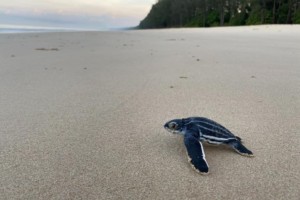Tourism’s resilience relies on sustainable, regenerative, needs-based models

For tourism destinations and service providers to survive and thrive in the face of current and looming challenges they must become more resilient, according to K Michael Haywood. Prof Haywood argues that this can be achieved by democratising ‘communities-as-destinations’ and enacting principles of sustainability and regeneration.
It’s a “Good Tourism” Insight. (You too can write a “GT” Insight.)
Tourism’s revival may be underway, though its resilience is being severely tested.
The Race for Tomorrow, for example, is being usurped by visitor attrition, transportation snafus, extreme staffing problems, soaring food and energy costs, tangled supply chains, and ‘greed-flation’; all leading to value-disruption. Good growth is hampered.
Charting the way forward will be a monumental challenge. Routine problems may be a first order of business, but it’s the more pressing societal and economic uncertainties, climate and conflict issues, plus a slew of future problems that seem beyond grasp.
Their avoidance, however, signals indifference to generating productive potential — economic, social, cultural, and environmental regeneration — thereby shortchanging opportunities to thrive, to live with conviction and meaning, and to be transformative in creating consequential value.
Tourism’s strategic resilience
Despite a hankering for longevity, organisations and destinations face a convergence of novel risks. They now have to contend with the fallout from a looming recession and their inadequate crisis response capabilities.
Financial resilience
With strategies constantly in contentious interaction with disruptive opposites, the management of risks is fraught; more so when the status quo derails planning. Plans and policies may be ill-fated unless there is financial resilience.
Sufficient liquidity, for example, must be available to cope with seasonal or severe drops in demand, increases in costs, and other response-related requirements.
The revision and crafting of more desirable and innovative functionalities requires a considerable investment in time, energy, and money, as does the creation of more sustainable, value-added products and experiences.
So, to achieve resilience, organisations and destinations have to stretch their imaginations in order to reshape and anticipate changes in demand; knowing what visitors want before they do.
This is true for all stakeholders, especially when faced with life-altering adversities.
Don’t miss “Good Tourism” content tagged with
“Tourism resilience and recovery”
Social resilience
Regardless of the stage of growth, great effort must be put into developing the fortitude to never give up on employees, customers, communities, and citizens.
This led Vancouver Island Tourism to rethink their capacities, which resulted in their renewed focus on social impact; a call-out to all DMOs seeking to provide community shared value as part of their commitment to enduring success.
Resilience is particularly contingent on the ability to attract, hold onto, and develop talent. To resolve the blows from the ‘great resignation’, organisations will have to demonstrate compassion regarding individuals’ personal resilience, and work harder to inspire a diverse and satisfied workforce.
To do so, trust must be rebuilt.
Technological resilience
With our digital world requiring higher degrees of technological resilience, it’s crucial to keep up with shifting customer, supplier, and organisational requirements, and to utilise technology (e.g. AI) to advance productivity and support a slew of operational, regulatory, and security demands.
Reputational resilience
Reputational resilience may be one of the most intangible and fleeting of assets. It’s bolstered when organisations and destinations commit to improving the quality of their offerings, keeping their brand promises and commitments to environmental, social, and governance (ESG) requirements.
Given the dynamism, challenges, and opportunities in varied marketplaces, resilience of all types requires adaptability and decisiveness. As we’re learning, this occurs when destination and organisational business models become sustainable, regenerative, and truly reflect the needs of society.
Tourism’s comprehensive sustainability
The cumulative crises and collateral damage brought about by climate change, toxic hate, pandemics, poverty, food insecurity, and environmental degradation, have magnified the necessity for all communities and industries to become comprehensively sustainable and socially and culturally sensitive.
Whereas besieged destinations, like Amsterdam, might seek tourism’s degrowth, the real demand is for ‘good growth’; the who, what, when, where, and why of development that creates transformative (economic, social, cultural, and natural) value.
Beyond the creation of businesses and jobs, however, value creation may be deemed absent if tourism’s untoward effects are ignored, particularly within our fragile ‘umwelt’ world and its highly interactive functional circle of humans and all species. Consider the beaches at The Last Resort.
Strategic resilience certainly requires sustainability to be operationalised. But what happens when it is undermined by mindless offerings that counter good deeds?
Now, more than ever, organisational requirements for growth and profits go for naught unless skewed towards value creation that is comprehensively sustainable.
Don’t miss “Good Tourism” content tagged with
“Sustainable tourism and regenerative tourism”
Tourism can (has to) become a prime source for renewed socio-economic ‘wellth’.
In destinations, such as Barbados, there may be few better options than to seek more realistic market solutions and transformations that lead to the development of novel conceptions of business, consumption, and experience.
But only if the purpose of tourism is re-thought and contained within comprehensive sustainability frameworks that favour value-creation intentionally designed to protect and honour people, place, and planet.
In this light, future-forward points-of-view will necessitate command of the carbon issue, engagement in the transition to clean energy, and a demand that the fossil fuel industry decarbonise.
By working collaboratively to resolve these issues, even extreme heat, the industry can live up to its potential as a builder of a better world.
Indeed, it begins at local levels by explaining and exploring comprehensive sustainability and how it fosters long-term resilience by providing substantial, intangible and tangible benefits to all.
Regenerative tourism
Resilience and sustainability cannot be strategic or comprehensive unless post-traumatic growth and transformative value-laden outcomes become paramount.
If only more organisations and destinations would link the protection of the ‘commons’ to their purpose and sign the Climate Friendly Travel Registry. Doing so would provide a credible endorsement for supporting tourism’s growth, inclusion, and sustainability.
With regenerative business practices the new norm, organisations will be obliged to take “a systems-thinking approach to create mutually beneficial feedback loops between physical, natural, economic, social, community, and human capital” in order for magnificence or net positive value to become the ultimate goal.
It cannot be willed.
Rather, what’s required is a radical redistribution of power: Power for all.
To derive what, collectively, communities-as-destinations truly value, collaborative wisdom must be sought. The Regenerative Communities Network shows it can be done.
But little will transpire until individual enterprises and destinations become proficient at creating just and healthier versions of tourism. Now. Or what Columbians say, Ahora.
Don’t miss other “GT” Insights by K Michael Haywood
Such an adjustment, however, requires democratising work and communities, rebuilding social capital, and regenerating culture (while negating cultural appropriation).
This brings to mind reconciliation processes with Indigenous peoples and tourism’s not-so-subtle role in perpetuating the Doctrine of Discovery (which needs repudiation).
Given the vast array of other calamities affecting, or affected by, tourism, destination-specific regenerative reconstruction frameworks need to be created.
To this end, it would be noble if government recovery programs required that financial aid be contingent upon investment in clearly identifiable regenerative activities.
All told, transformative regeneration represents an invitation to engage in insightful, value-enhancing processes that affirm the desire for and dynamics of healthy ecosystems and highly adaptive and emergent communities-as-destinations.
With the intention “to co-create a future where humanity has a regenerative impact on the planet … regenerating social cohesion, vibrant regional economies, and the re-discovery of meaning and purpose”, all of us engaged in tourism can do far more to invigorate and fortify resilience and sustainability.
After all, we all desire to tell and share better stories of who we are and want to be.
What do you think? Share a short anecdote, comment, or question below. Or write a “GT” Insight of your own. The “Good Tourism” Blog welcomes diversity of opinion and perspective on travel & tourism because travel & tourism is everyone’s business.
Featured image (top of post): Can tourism be resilient, like ivy? Image by Alicia Mary Smith (CC0) via Unsplash.
About the author

K Michael Haywood is Professor Emeritus, School of Hospitality, Food and Tourism at the University of Guelph in Ontario, Canada. Prof Haywood has recently written an e‑book “Astonish, Smarter Tourism by Design”. Find Michael on LinkedIn.





